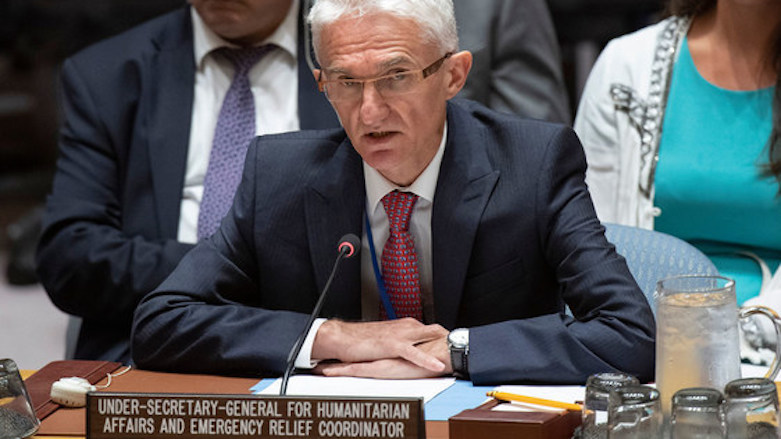UN relief chief calls for de-escalation in Syria after continued Turkish threats

ERBIL (Kurdistan 24) – Mark Lowcock, the United Nations Under-Secretary-General for Humanitarian Affairs, on Tuesday called on UN member states to de-escalate the growing tensions along the borders of Turkey and northeast Syria.
There are currently 734,000 people who receive monthly assistance in Syria’s northeast, including 70,000 civilians at the Al Hol camp.
During an address to the UN Security Council, Lowcock said he remains “extremely concerned about people there.”
Earlier in the day, Maher Husain Mohammad, a young boy, was injured after a Turkish sniper hit him in the Saftak village near Kobani close to the border, a Syrian Democratic Forces (SDF) official and a local news agency said.
On Friday, Turkish President Recep Tayyip Erdogan again threatened to attack the east of the Euphrates, even if a safe zone is established.
Turkey claims the US-backed SDF that controls the northeast is linked to the outlawed Kurdistan Workers’ Party (PKK). The SDF has denied these accusations.
On Tuesday, Erdogan chaired a meeting of the Turkish National Security Council in which they agreed to create a “peace corridor” in the northeast.
Despite this, separate talks between the US-SDF and the US-Turkey to establish a safe zone on the Syrian-Turkish border have so far prevented a Turkish attack.
However, the US has been unable to get Turkey and the SDF to agree on a safe zone plan.
A report published this week by the humanitarian organization Refugee International said humanitarians and local community leaders believe that a Turkish-controlled zone “could plunge northeast Syria into renewed conflict, displacing hundreds of thousands, and forcing most international aid organizations to evacuate.”
According to the report, the local population in northeast Syria is particularly concerned over Turkish-backed militias that Ankara could use in a possible attack. Turkey used the same fighters when it occupied Afrin last year.
It added that these groups have reportedly committed serious human rights abuses against the local civilian population.
Therefore, Refugee International argued that “any buffer zone between Turkey and northeast Syria should do no harm,” adding Washington “should prioritize the principle of ‘do no harm.’”
“Specifically, whatever arrangement may be negotiated with respect to a buffer zone must prioritize the well-being of the civilian population in northeast Syria,” the report said. “The United States should refuse to facilitate any such arrangement that would likely trigger hostilities or widespread displacement.”
Amjad Othman, a spokesperson for the Syrian Democratic Council (SDC), the political wing of the SDF, recently said in a statement that “any attack on the north and eastern regions of Syria [would] be met with resistance and [would] have severe consequences.”
“We do not want war with any party or expose our people to risks. Our main demand is pursuing dialogue to solve all problems.”
Editing by Karzan Sulaivany
